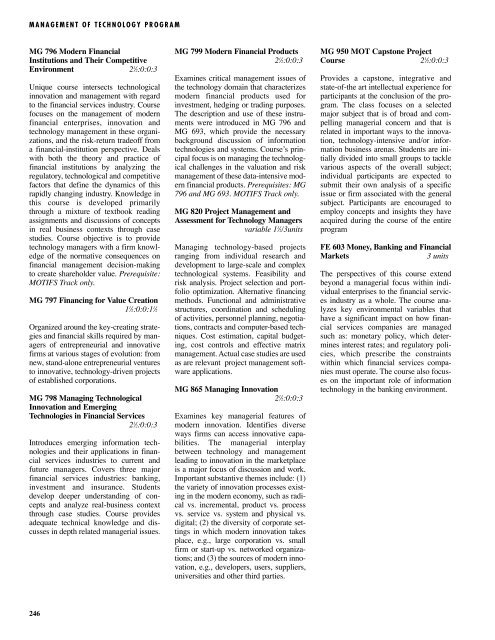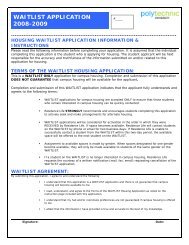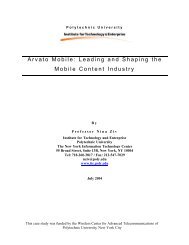POLYTECHNIC UNIVERSITY 2005-2007
POLYTECHNIC UNIVERSITY 2005-2007
POLYTECHNIC UNIVERSITY 2005-2007
You also want an ePaper? Increase the reach of your titles
YUMPU automatically turns print PDFs into web optimized ePapers that Google loves.
MANAGEMENT OF TECHNOLOGY PROGRAM<br />
MG 796 Modern Financial<br />
Institutions and Their Competitive<br />
Environment 2 1 ⁄2:0:0:3<br />
Unique course intersects technological<br />
innovation and management with regard<br />
to the financial services industry. Course<br />
focuses on the management of modern<br />
financial enterprises, innovation and<br />
technology management in these organizations,<br />
and the risk-return tradeoff from<br />
a financial-institution perspective. Deals<br />
with both the theory and practice of<br />
financial institutions by analyzing the<br />
regulatory, technological and competitive<br />
factors that define the dynamics of this<br />
rapidly changing industry. Knowledge in<br />
this course is developed primarily<br />
through a mixture of textbook reading<br />
assignments and discussions of concepts<br />
in real business contexts through case<br />
studies. Course objective is to provide<br />
technology managers with a firm knowledge<br />
of the normative consequences on<br />
financial management decision-making<br />
to create shareholder value. Prerequisite:<br />
MOTIFS Track only.<br />
MG 797 Financing for Value Creation<br />
1 1 ⁄2:0:0:1 1 ⁄2<br />
Organized around the key-creating strategies<br />
and financial skills required by managers<br />
of entrepreneurial and innovative<br />
firms at various stages of evolution: from<br />
new, stand-alone entrepreneurial ventures<br />
to innovative, technology-driven projects<br />
of established corporations.<br />
MG 798 Managing Technological<br />
Innovation and Emerging<br />
Technologies in Financial Services<br />
2 1 ⁄2:0:0:3<br />
Introduces emerging information technologies<br />
and their applications in financial<br />
services industries to current and<br />
future managers. Covers three major<br />
financial services industries: banking,<br />
investment and insurance. Students<br />
develop deeper understanding of concepts<br />
and analyze real-business context<br />
through case studies. Course provides<br />
adequate technical knowledge and discusses<br />
in depth related managerial issues.<br />
MG 799 Modern Financial Products<br />
2 1 ⁄2:0:0:3<br />
Examines critical management issues of<br />
the technology domain that characterizes<br />
modern financial products used for<br />
investment, hedging or trading purposes.<br />
The description and use of these instruments<br />
were introduced in MG 796 and<br />
MG 693, which provide the necessary<br />
background discussion of information<br />
technologies and systems. Course’s principal<br />
focus is on managing the technological<br />
challenges in the valuation and risk<br />
management of these data-intensive modern<br />
financial products. Prerequisites: MG<br />
796 and MG 693. MOTIFS Track only.<br />
MG 820 Project Management and<br />
Assessment for Technology Managers<br />
variable 1 1 ⁄2/3units<br />
Managing technology-based projects<br />
ranging from individual research and<br />
development to large-scale and complex<br />
technological systems. Feasibility and<br />
risk analysis. Project selection and portfolio<br />
optimization. Alternative financing<br />
methods. Functional and administrative<br />
structures, coordination and scheduling<br />
of activities, personnel planning, negotiations,<br />
contracts and computer-based techniques.<br />
Cost estimation, capital budgeting,<br />
cost controls and effective matrix<br />
management. Actual case studies are used<br />
as are relevant project management software<br />
applications.<br />
MG 865 Managing Innovation<br />
2 1 ⁄2:0:0:3<br />
Examines key managerial features of<br />
modern innovation. Identifies diverse<br />
ways firms can access innovative capabilities.<br />
The managerial interplay<br />
between technology and management<br />
leading to innovation in the marketplace<br />
is a major focus of discussion and work.<br />
Important substantive themes include: (1)<br />
the variety of innovation processes existing<br />
in the modern economy, such as radical<br />
vs. incremental, product vs. process<br />
vs. service vs. system and physical vs.<br />
digital; (2) the diversity of corporate settings<br />
in which modern innovation takes<br />
place, e.g., large corporation vs. small<br />
firm or start-up vs. networked organizations;<br />
and (3) the sources of modern innovation,<br />
e.g., developers, users, suppliers,<br />
universities and other third parties.<br />
MG 950 MOT Capstone Project<br />
Course 2 1 ⁄2:0:0:3<br />
Provides a capstone, integrative and<br />
state-of-the art intellectual experience for<br />
participants at the conclusion of the program.<br />
The class focuses on a selected<br />
major subject that is of broad and compelling<br />
managerial concern and that is<br />
related in important ways to the innovation,<br />
technology-intensive and/or information<br />
business arenas. Students are initially<br />
divided into small groups to tackle<br />
various aspects of the overall subject;<br />
individual participants are expected to<br />
submit their own analysis of a specific<br />
issue or firm associated with the general<br />
subject. Participants are encouraged to<br />
employ concepts and insights they have<br />
acquired during the course of the entire<br />
program<br />
FE 603 Money, Banking and Financial<br />
Markets<br />
3 units<br />
The perspectives of this course extend<br />
beyond a managerial focus within individual<br />
enterprises to the financial services<br />
industry as a whole. The course analyzes<br />
key environmental variables that<br />
have a significant impact on how financial<br />
services companies are managed<br />
such as: monetary policy, which determines<br />
interest rates; and regulatory policies,<br />
which prescribe the constraints<br />
within which financial services companies<br />
must operate. The course also focuses<br />
on the important role of information<br />
technology in the banking environment.<br />
246




